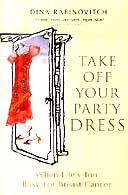
Take Off Your Party Dress: When Life's Too Busy for Breast Cancer
by Dina Rabinovitch
256pp, Pocket Books, £7.99
Dina Rabinovitch was diagnosed with breast cancer in 2004, a week or two after I was. Despite the fact that we never met, it would have been almost impossible not to be aware of each other - Rabinovitch is a children's book reviewer, and I'd just written my first children's book; her Guardian column detailed day-to-day life with cancer, while my book was reviewed under headlines like "Suffering: That's How She Lives Now." Take Off Your Party Dress is Rabinovitch's memoir of the days and weeks that followed her diagnosis, and the subtitle - "When Life's Too Busy for Breast Cancer" - makes me suspect a marketing department determined to keep the whole Cancer Thing upbeat. After all, as the author is told by another publisher, "the breast cancer memoir is a crowded market".
The reason it's a crowded market is that more than 40,000 UK women are diagnosed with breast cancer each year. And if the market is crammed with infuriatingly "courageous", "inspiring" misery-lit tales, perhaps that's a measure of how publishers have viewed the disease and those of us who have it. Of course Rabinovitch's book was never going to be another Bridget Jones's Diary - unless you imagine what might happen to Bridget when she grows up and hits real life, has kids, gets divorced and finds out that alcohol consumption and weight loss are the least of her problems.
Take Off Your Party Dress is the story of a woman with a big, complicated life coping with a big, complicated disease. The author lives with a revolving cast of eight children: four from her husband's first marriage, three from her first marriage, and a son they had together. The logistics of the "tortured divorce" that created this 1960s sitcom-scale family are only hinted at, but it doesn't take a genius to figure out that it must have been a mess. The book begins not with a diagnosis, but a description of the house that Rabinovitch and her husband bought to try to heal the wounds of their respective divorces. The scars of mastectomy, one suspects, pile on top of those earlier wounds. "There is a Pandora's box aspect to what are called blended families," she writes, "where every time the front door opens different bits of family history collide."
The damnable fact - and possibly the saving grace - of serious illness is that it has the power to strip away the evasions that mask the human soul. In Rabinovitch's case, this stripping away has revealed a delicious gift for storytelling and a conspicuous passion for living. If you are tough and you have a sense of life's irony, she seems to say, then illness hones what you are, forces you to become clearer and more honest than before. As a reporter on the front lines of family life in crisis, she has produced a work of remarkable insight and clarity.
Rabinovitch's story is as much about life as about the things that threaten it, a document of the surreal, cranky, infuriating way she now lives. A well-meaning neighbour gives her son three goldfish, and keeping them alive becomes one desperate life-and-death struggle too many. The whole family goes down with flu. Children and teenagers come and go, breaking up with boyfriends, worrying, whispering on landings, shouting in their sleep. There are work deadlines and school fetes and birthdays, there are Jewish holidays and trips abroad, acceptances and rejections. When she blurts out at a book launch that the cancer has returned, her friends go silent and turn away.
And then there are the oncologists, the surgeons, the radiologists, the nurses. They are wonderfully skilful and kind, they come equipped with a huge supply of drug trials, new treatments and therapies, but they cannot do what is required. They cannot make it go away. As time passes, Rabinovitch's doctors struggle to keep up with the frantic pace of change in "the outer reaches of cancer treatment". Suddenly she is faced with untested regimens and drugs too new to have names.
And then, slowly, surely, another story emerges. The one about drug companies investing in expensive treatments rather than research because, well, because they're in the business of selling drugs. At one point she totals up the cost of her treatment so far: £75,000 - 10 times the advance she received for this book, which is the cornerstone of her campaign to raise £1m for cancer research at the hospital that treated her. "So my life is worth 10 times more than my thoughts on life," she muses. But this drastically underestimates the value of her thoughts on life, which are worth infinitely more than she imagines.
· Meg Rosoff's Just In Case is published by Puffin

